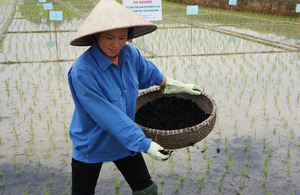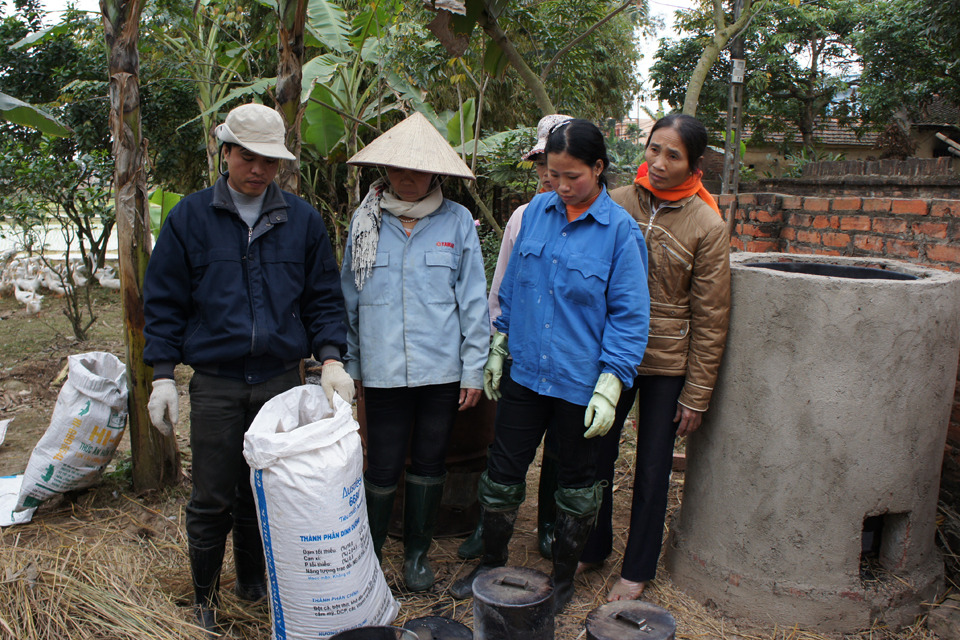Less ploughing, more crops, happier families
How biochar - an innovative solution which improves soil and reduces pollution - is helping farmers in Vietnam

Luong fertilising her field with biochar. Picture: Nguyen Hoang Ha/DFID
Nguyen Thi Luong is a farmer in Soc Son district, Hanoi. Over the last 2 years, her farm has gone from strength to strength thanks to UK aid supported biochar, a carbon-rich charcoal like substance, which can help improve soil quality.
As well as looking after 2 small children, Luong is the main labourer on the family farm, as her husband has to work away from home for most of the year.
Growing enough food to feed her family used to be difficult - the agricultural land in Soc Son is mainly red soil which is low in nutrients and difficult to cultivate.
“Though I owned only 6 sao (360 metres square) of land, I had to spend days ploughing the soil before planting each crop to make it soft enough for the growing rice,” says Luong. “And even then, the land was still very poor and wouldn’t yeild a lot of produce.”
There were seasons when crop growth was so bad that Luong had to buy extra rice from the market to feed her family.
Smart application of biochar
Previously, after harvesting, farmers collected any remaining straw and burned it on the field. This was thought to improve the quality of their soil but the smoke from the burning would stretch for miles, causing pollution over a large area.
However, thanks to the Vietnam Innovation Day 2010 - a UK aid supported initiative that addresses local development challenges - biochar was introduced to farmers like Luong in Soc Son.
With financial support from the UK and other donors, simple, easy-to-make earthen kilns were built to create low-oxygen conditions to burn straw. Farmers also received on-the-spot training about how to best handle the kilns and how to fertilise their paddy fields with the biochar they produce.

Luong (second from left) and other farmers at a training session on basic techniques to make biochar. Picture: Nguyen Hoang Ha/DFID
And it’s not just rice straw and husk that’s being burnt - farmers like Luong are now burning a whole variety of agricultural residues in this environmental friendly way.
As a result, farmers in Soc Son are protecting the environment, saving time and money on fertiliser and improving the quality of their land. And this in turn means that they’re able to provide their families with the food they need.
Promising green growth
Luong has been using biochar in her field for 5 crops, and has seen a huge improvement in her land quality.
“It becomes much softer, so ploughing is much less intensive,” she says. “Now I have more time for other housework and to take care of my children.”
“Also productivity has gone up which means I don’t have to buy extra rice any more.”
Luong is among the first 40 households in Soc Son that are taking part in the biochar programme. The initiative is being extended in Soc Son, and replicated in other provinces across Vietnam, such as Hai Duong and Long An.
Facts and stats
As one of the largest rice exporters in the world, Vietnam is benefiting from small but innovative ideas like biochar which are helping to create a profitable and environmentally friendly future for agriculture.
The Vietnam Innovation Day (VID) programme is a “mini marketplace” for innovative ideas that address local development challenges. It is an annual event which has a different theme each year. VID identifies and directly supports small innovative bottom-up development ideas that deliver results, which can then be expanded or replicated.
The Department for International Development (DFID) has been among key donors of the Vietnam Innovation Day for many years.